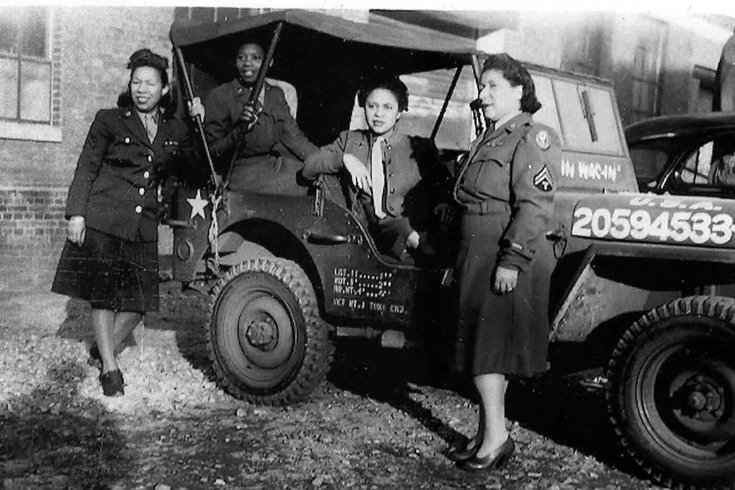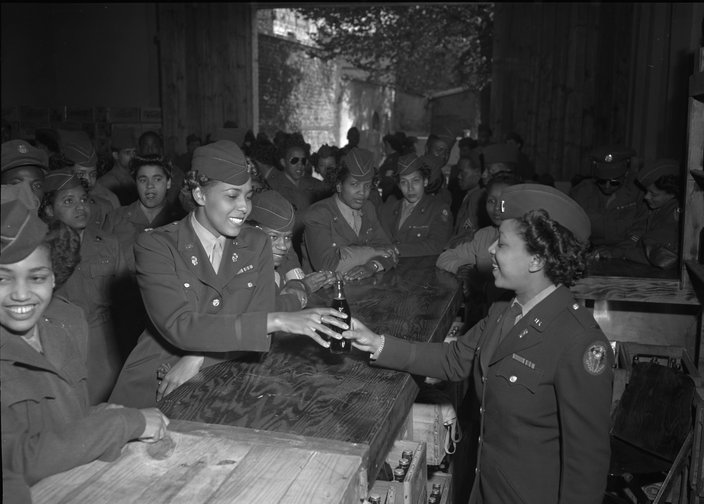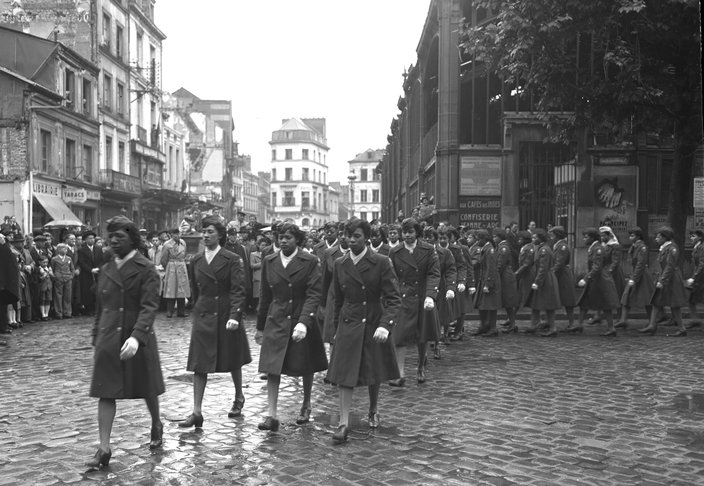
December 18, 2024
 Source/U.S. Department of Defense
Source/U.S. Department of Defense
The Black women of the Six Triple Eight cleared stacks of backlogged mail in Birmingham and France during World War II. Philadelphia resident Sylvia Benton, seated in the back of the Jeep, was among them. The story of the 6888th Battalion is told in a new Netflix film.
When World War II broke out, American women joined the effort by manning switchboards, riveting together airplanes and nursing wounded soldiers back to health. But due to discriminatory military policies of the time, only a fraction followed the male troops to Europe where the fighting raged on.
Longtime Philadelphia resident Sylvia Benton was among those deployed overseas. Benton served in the 6888th Central Postal Directory Battalion, colloquially known as the Six Triple Eight, in the final years of the war. This unit, comprised entirely of Black women, cleared warehouses full of backlogged mail in Birmingham in just three months, then sailed to Rouen, France, to do the exact same thing. Their achievements are chronicled in the new film "The Six Triple Eight" debuting Friday on Netflix.
"If you're a service member, mail is king," Dennis Miller, Benton's grandson, said. "Because you're in a tough situation. You're having to escape death every day, especially in World War II. So being able to hear anything from home, just basic, regular talk – 'How you doing,' 'We love you,' whatever – that connection really does something that you can't duplicate."
The Six Triple Eight was created in 1944, only after the establishment of the Women's Army Corps and significant advocacy from civil rights leaders like Mary McLeod Bethune. Apart from small groups of Black nurses deployed to Australia, Africa and England, this battalion was the only all-Black WAC unit to serve overseas during World War II.
Its roughly 885 members completed basic training in Fort Oglethorpe, Georgia, before boarding a ship to Birmingham in February 1945. They commandeered an airplane hangar to serve as their post office, blacking out the windows to avoid detection from dive-bombers. The piles of mail housed inside included care packages with pies and cakes, which had attracted hungry rats that crawled the floors.
"It was cold, nothing heated," Lena Derriecott Bell King, another Philly native who enlisted in the unit, recalls in an interview with the American Veterans Center. "But we were young, we were strong, we survived."
The women split their work across three eight-hour shifts so someone was always sorting the mail. Once a member of the 688th was off the clock, she had eight hours to rest and another eight hours to herself, but as Miller emphasized, the women were busy even during their downtime. They ran their own mess hall, hair salon, refreshment bar and recreational space, refusing to use the segregated facilities offered by the Red Cross.
 Source/National Archives
Source/National ArchivesThe 6888th Central Postal Directory Battalion ran their own mess hall, hair salon, snack bar and recreational space. A second lieutenant serves a Coke to the unit's commanding officer, Charity Adams Earley, at their snack bar in Rouen in the photo above.
"The eight hours off really weren't off because there were no auxiliary units there," Miller said. "They did everything. All of the cooking, cleaning. If you had a background of being a nurse, you took care of people. All of the things that needed to get done in a regular day were done by the unit themselves."
The 6888th devised a new filing system to solve common problems that stymied mail delivery. Sometimes family members addressed their letters insufficiently, leaving off soldiers' units or last names. In other cases, the full name was the problem. The U.S. military had 7,500 different men named Robert Smith in its forces, making delivery to the right Bob a bit of a bear. Still, the women waded through the stacks with impressive speed and efficiency. They processed an average of 65,000 pieces of mail per shift. "No mail, low morale" became their motto.
Although a general predicted the unit would need six months to clear the backlog, they did it in half the time. The mission in Birmingham complete, the 6888th then traveled on to Rouen, arriving on the heels of VE Day in Europe. They cleared another yearslong backlog of mail in three months.
As the war ended, the unit gradually thinned. The last of the 6888th had disbanded at Fort Dix in New Jersey by early 1946. From there, Benton, a Savannah native, decamped to Philadelphia. She went on to start a family and run a laundromat on Point Breeze Avenue in South Philly for several years.
Benton also, in her grandson's words, raised "a clan of warriors." All of her sons and grandsons, including Miller, enlisted. His daughter, Benton's great-grandchild, starts basic training in January.
 Source/National Archives
Source/National ArchivesUpon their arrival in Rouen, the women of the 6888th participated in a parade honoring Joan of Arc. She was burned at the stake at the French city.
Miller doesn't remember his grandmother ever complaining about the conditions she faced. She rarely talked about her service while she was alive, he said, only opening up slightly after he enlisted in the Marine Corps himself. The women of the 6888th were simply "there to do the work" in his estimation, and cared little for griping or boasting.
The federal government and popular history paid them little recognition, either, for several decades. But that's changed in recent years thanks to the work of descendants and veterans like Carlton Philpot, who spearheaded the construction of a monument to the 6888th at Fort Leavenworth. The unit received the Congressional Gold Medal in 2022. Benton died in 2010, but her grandson has plans to deliver it to her personally.
"I miss her every day," Miller said. "I go to visit her grave regularly, sit and talk to her. When we get the congressional gold medal minted, I'm going to take the medal out to her grave and show her."
Follow Kristin & PhillyVoice on Twitter: @kristin_hunt
| @thePhillyVoice
Like us on Facebook: PhillyVoice
Have a news tip? Let us know.